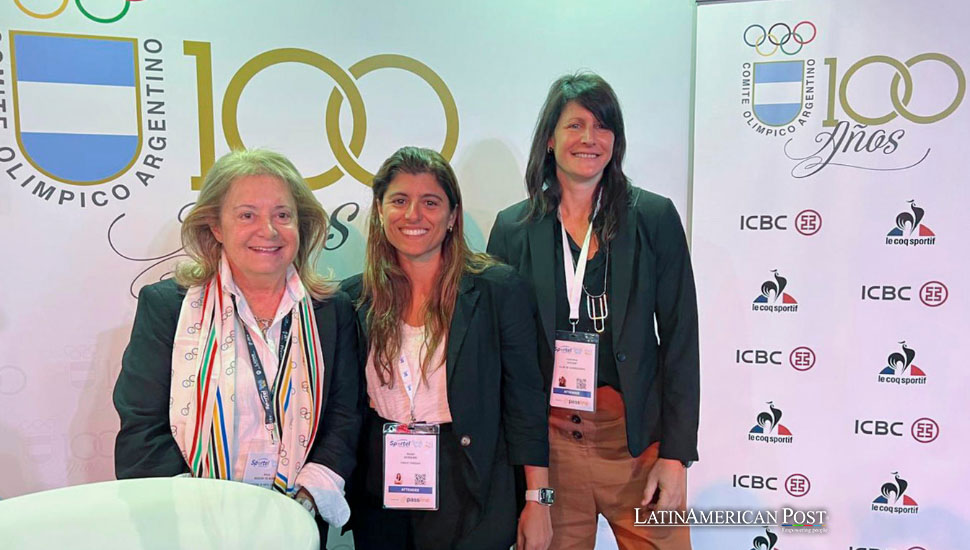Female Sports Emerging as Lucrative Business Opportunity in Latin America

At a recent conference in Buenos Aires, experts highlighted the exponential growth of women’s sports and its emergence as a profitable business avenue, signaling a transformative shift in the sports industry’s dynamics in Latin America.
During a pivotal conference in Buenos Aires focused on sports production, a compelling discussion titled “The Boom of Women’s Sports: From Audience to Commercial Opportunities” shed light on the rapidly growing sector of women’s sports. As Latin America grapples with evolving cultural and economic landscapes, this growth reflects changing perceptions and presents new business potentials in the region.
Historically, sports in Latin America have mirrored the broader social and cultural dynamics prevalent in the region, with women often marginalized in what has traditionally been a male-dominated area. However, there has been a significant shift over the past few decades. Women’s sports have begun to gain visibility and popularity, driven by greater societal acceptance and the inspiring success of female athletes on global stages.
Economic and Social Impacts
The discussion in Buenos Aires, led by John P. Reynal, executive director of the Women’s Cup, emphasized the importance of viewing women’s sports as a thrilling and viable business opportunity. According to Reynal, the audience for women’s sports is growing at a rate of 200% across metrics like television viewership, stadium attendance, and sponsorship. This surge presents a prime opportunity for brands and investors looking to tap into new and engaged markets.
Despite the promising growth, challenges persist. Reynal pointed out a “lack of knowledge mixed with a bit of fear” as reasons for commercial brands’ hesitation to sponsor women’s sports. Addressing these fears through education and demonstrating the success of investments in women’s sports is crucial for future growth. Additionally, women’s sports in Latin America often struggle with a lack of funding and media coverage, which hampers their ability to attract sponsors and build a strong fan base. Overcoming these challenges will be key to sustaining the growth of women’s sports in the region.
Insights from Local Champions
The event also featured insights from former Argentine international athletes Natalí Doreski (hockey) and Valentina Kogan (handball), who have transitioned into roles connecting businesses with sports projects. Doreski, a co-founder of 5 Yardas, a sports marketing agency, highlighted the long-term benefits of partnerships between firms and sports. As a member of ‘Las Leonas,’ the world champion team from Perth in 2002, she also stressed the importance of eliminating gender discrimination in sports.
Kogan shared her experience with Club de Corredores, a company that organizes street and adventure races across Latin America. She noted the significant increase in women’s participation in their events, from 35% fifteen years ago to 50% today, underscoring a growing trend that enhances the appeal of running as a business.
The shift towards gender equality in sports is also supported at the institutional level. Alicia Masoni de Morea, Vice President of the Argentine Olympic Committee, noted that the 2024 Paris Games would be the first to achieve total gender parity. She also referenced a Nielsen report indicating that 84% of general sports fans are interested in women’s sports, highlighting the untapped potential of this market.
Media’s Role in Shaping Perceptions
The conference also addressed the need for responsible media coverage that actively promotes gender equality in sports, avoiding perpetuating stereotypes and sexualization, which can hinder the progress of women’s sports. Media outlets are critical in shaping public perceptions and can be a powerful force in this positive change.
Also read: Mexico and the USA Postpone Women’s World Cup Soccer Bid to 2031
The panel at the Sportel Rendez-vous in Buenos Aires was more than a discussion; it was a clarion call for recognizing the untapped potential of women’s sports. As Latin America continues to evolve, the integration of women in sports challenges longstanding cultural norms and opens up new avenues for economic growth and social development. This transition, supported by strategic partnerships and progressive policies, could redefine the sports landscape in the region, making it more inclusive and economically vibrant. As the sector grows, it will undoubtedly influence broader societal changes, making women’s sports an integral part of Latin America’s social and economic fabric. Moreover, the increased visibility and success of women’s sports can serve as a powerful tool for promoting gender equality and empowering women in the region.





